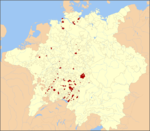world.wikisort.org - France
Munster (French pronunciation: [mœ̃stɛʁ], German: Münster im Elsass) is a commune in the Haut-Rhin department in Grand Est in north-eastern France.
This article may be expanded with text translated from the corresponding article in French. (July 2014) Click [show] for important translation instructions.
|
Munster | |
|---|---|
Commune | |
 Protestant Church | |
 Coat of arms | |
Location of Munster  | |
 Munster  Munster | |
| Coordinates: 48°02′N 7°08′E | |
| Country | France |
| Region | Grand Est |
| Department | Haut-Rhin |
| Arrondissement | Colmar-Ribeauvillé |
| Canton | Wintzenheim |
| Intercommunality | Vallée de Munster |
| Government | |
| • Mayor (2020–2026) | Pierre Dischinger [1] |
| Area 1 | 8.64 km2 (3.34 sq mi) |
| Population | 4,699 |
| • Density | 540/km2 (1,400/sq mi) |
| Time zone | UTC+01:00 (CET) |
| • Summer (DST) | UTC+02:00 (CEST) |
| INSEE/Postal code | 68226 /68140 |
| Elevation | 341–794 m (1,119–2,605 ft) (avg. 380 m or 1,250 ft) |
| 1 French Land Register data, which excludes lakes, ponds, glaciers > 1 km2 (0.386 sq mi or 247 acres) and river estuaries. | |
It is located in a valley of the Vosges mountains about 15 kilometres west of Colmar on the D417 road to the Col de la Schlucht and Épinal.
The town's inhabitants are known in French as munstériens.
The site of a 7th-century abbey or monastery, which gave the place its name, it is famous for its cheese (the Munster cheese).
In the nearby village of Gunsbach, Albert Schweitzer grew up in the late 19th century, when the region was known as Elsaß-Lothringen (Alsace-Lorraine) and was part of the German Empire from 1871 to 1918. The village is home to the international Albert Schweitzer association AISL (Association Internationale Schweitzer Lambaréné).[3]
- Dom George Franck (c.1690 – 1760) organist and composer was born in Munster.

- View to a street with reformed church and catholic church in the background
- View to a street: Place du Marché-rue Saint-Gregoire-Grand Rue with townhall
- View to a street: Rue du 9e Zouaves
See also
- Communes of the Haut-Rhin département
- Munster cheese
References
- "Répertoire national des élus: les maires". data.gouv.fr, Plateforme ouverte des données publiques françaises (in French). 2 December 2020.
- "Populations légales 2019". The National Institute of Statistics and Economic Studies. 29 December 2021.
- "Association Internationale Albert Schweitzer". Archived from the original on 2010-12-09. Retrieved 2007-10-17.
External links
- Tourism office website
- Chisholm, Hugh, ed. (1911). . Encyclopædia Britannica. Vol. 19 (11th ed.). Cambridge University Press.
- Flickr Munster
На других языках
- [en] Munster, Haut-Rhin
[ru] Мюнстер (Верхний Рейн)
Мюнстер (фр. Munster) — коммуна на северо-востоке Франции в регионе Гранд-Эст[1] (бывший Эльзас — Шампань — Арденны — Лотарингия), департамент Верхний Рейн, округ Кольмар — Рибовилле, кантон Винтсенайм[2]. До марта 2015 года коммуна являлась административным центром упразднённого кантона Мюнстер (округ Кольмар).Другой контент может иметь иную лицензию. Перед использованием материалов сайта WikiSort.org внимательно изучите правила лицензирования конкретных элементов наполнения сайта.
WikiSort.org - проект по пересортировке и дополнению контента Википедии




